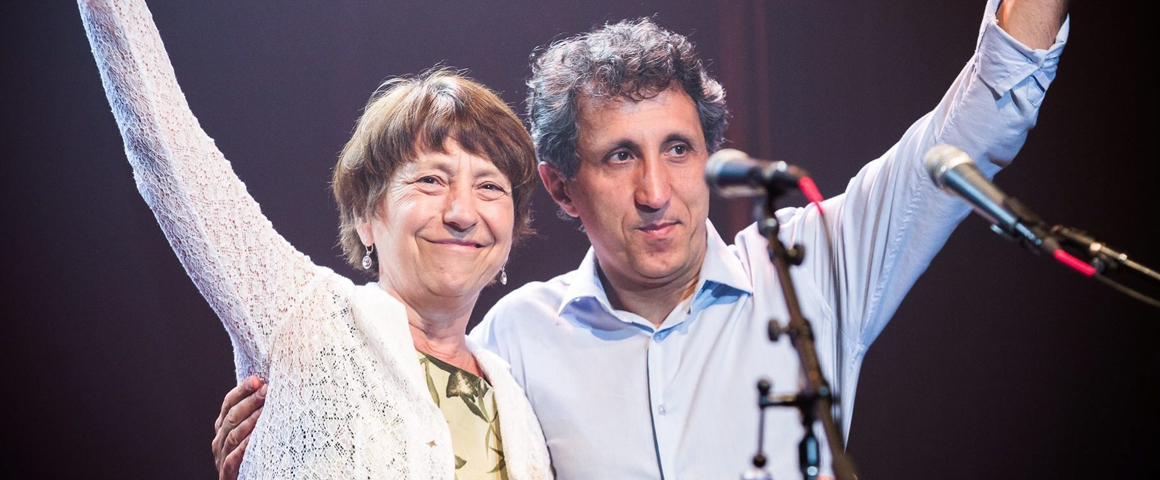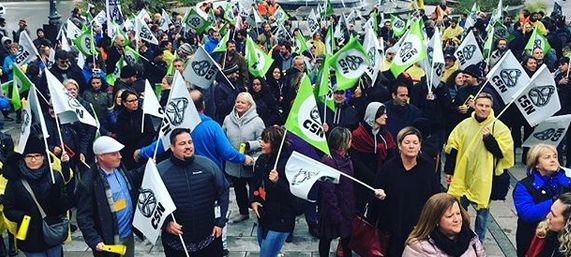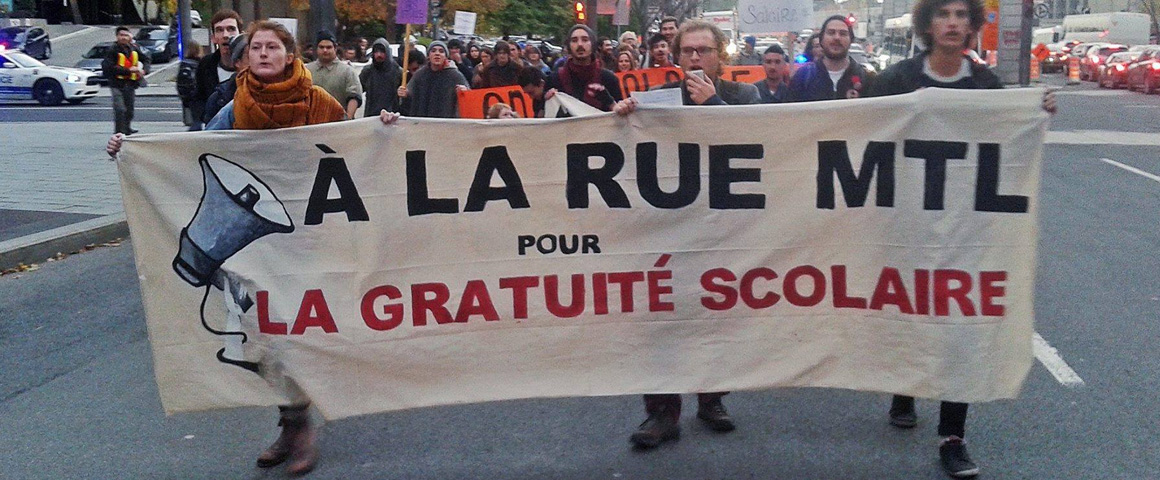Quebec Solidaire marked its tenth anniversary with a special celebration, and a sharp debate about changing or maintaining existing party policy on the national question over its two-day party Congress, held at Montreal in late May. Successfully weaving together many strands of the Quebec left over the years, QS now holds three seats in the National Assembly while maintaining its perspective as a party not only of the parliament but also of the streets.
Party spokespeople MNA Françoise David and community activist Andrés Fontecilla were visibly overjoyed at the ten year anniversary, announcing that the greetings received from so many stars of Quebec culture symbolized the party’s break from “marginality.”
While it is a reflection of the national question and the two solitudes between Quebec and English-speaking Canada that many of these internationally acclaimed artists are relatively unknown in the rest of the country, the big names included author Normand Baillargeon, singer Bia, director Hugo Latulippe, and story teller Fred Pellerin and especially Cannes award-winning film director Xavier Dolan.
“Luckily, some people don’t just think about the present, or the futur proche [short-term] or an immediate pay-off, but the future. Those people work for a society, not just a system or goal or dogma. Those people feel the injustices, and imagine and plan the next steps. Not in the media, but in the future. And for me, those people are you – Quebec Solidaire,” Dolan said in a video-taped message which poetically spoke to the main question of the Congress – the future of Quebec.
Greetings were also received from Canadian essayist Naomi Klein and Noam Chomsky. “It’s a breath of fresh air in the grim neoliberal era which has brought such grief and despair and often unfocused anger to so many people who have been cast by the wayside as the neoliberal policies are designed to enrich and empower very narrow sectors of wealth and power,” said Chomsky.
The sentiment of the gathering was strongly optimistic. Ten years ago the party had just emerged, created when the Union des forces progressistes (UFP) voted in favour of merging with the feminist Option citoyenne movement of Françoise David.
“Our challenge over the first 10 years has been to put Québec Solidaire on the map and we have succeeded. Now for the next 10 years, it is time for us to win the government, and succeed in having a majority [in the National Assembly] to implement the truly innovative proposals we have for Quebec,” Andrés Fontecilla was quoted as saying in La Presse.
The debates in the annual Congress included constitutional reforms, expanding policy on the environment and climate change, LGBTQI and transgendered rights, as well as re-orienting certain economic policies. But the main discussion pivoted on the national question and re-considering QS’s long standing policy towards independence through an open Constituent Assembly process and the drafting of a new Constitution.
Not far in the background of this debate was the question of “an alliance of sovereigntist forces” including both Option Nationale, a left-nationalist splinter from the Parti Québécois (PQ), and the PQ itself. In January, bringing this long-discussed proposal from the abstract to the concrete, Pierre Karl Péladeau (leader of the PQ) proposed such a broad alliance against the Quebec Liberals.
While QS initially rejected the proposal, the leadership vacillated over several months when ruling-out any future cooperation.
In a debate that often exhibited a considerable fluidity and differing understandings of what was a short-term tactic vs. a long-term strategy, discussion about QS-PQ unity became submerged into a debate over changing Quebec Solidaire’s proposed route for independence. The experiences of recent referenda in Scotland and Catalonia were also very much in the foreground.
Since its creation, the Parti Québécois has fought for independence via a provincial referendum. In 1980, before the repatriation of the Constitution, the PQ sought a mandate to negotiate a new relationship based on “sovereignty association” with the federal government, which voters rejected by a margin of 19.12 per cent.
In 1995, voters defeated another proposal which would essentially have led to a declaration of independence, by a margin 0.58 per cent. (Voter turnout was higher turnout than any provincial or federal election in Canada’s history). Because of its Yes/No nature, the referendum strategy has sometimes been called “the lobster trap” by its detractors, after some supposedly ill-advised comment of Jacques Parizeau.
By the time of the second referendum, the PQ was largely into a party of Big Business. The upsurge in anti-neoliberal and anti-globalization sentiment in the late 90s across Quebec, the growing rift by social democratic nationalist forces away from the PQ, as well as the renewed presence of the non-nationalist Parti Communiste du Quebec (PCQ) in provincial politics all created the trajectory which formed Quebec Solidaire.
Rejecting the PQ’s referendum strategy and narrow nationalism in general, QS asserted that independence was secondary to a broader social or class project of popular struggle such as against privatization and for expansion of public services and programmes, curbing corporate power, for ecology, feminism as well as other democratic rights and, while not clearly for socialism at least, “beyond capitalism.”
Later, it revised independence to be main goal, but avoided the national nationalist orientation on this question alone. As the PQ drifted into the islamophobic swamp of nationalist identity politics with its Charter of Values and most recently the de-facto alliance of Harper and the Bloc on a similar basis, QS has been a strong anti-racist, pro-equality voice.
Instead of a referendum, QS calls to draft a new Constitution for Quebec, echoing an historic position of the PCQ. However, within that debate, QS would advocate for secession and independence. The PCQ, on the other hand, calls for a new, equal and voluntary partnership between Quebec and English-speaking Canada (as well as Aboriginal nations and the Acadians) up to and including the right of secession.
A third option could be a proposal for status-quo federalism (such as a renewed form of autonomy which the New Democratic Party proposes with its Sherbrooke Declaration). While these three distinct paths were not placed directly before the Congress, they came forward in different and even contradictory permutations in the pre-Congress discussion.
For those who doubted that a pro-independence party would entertain a Constituent Assembly process which could result in a different outcome than independence, this Congress saw countless delegates rise to the floor and argue just that.
Sovereignty is a question not for a political party, or even the Quebec National Assembly, but the people themselves, these delegates argued. To prejudice the outcome would be to exclude vast sections of the population. If Quebec Solidaire’s social project can go no further without independence, then we must face this problem at that moment. All the people will need to be won to this position.
Other delegates argued for an approach based on a passionate, eager and yearning vision of a new country. (Never mind if it requires making pacts with the political representatives of the very big corporations which are the source of the social crisis faced by the people of Quebec).
In a tight vote, and after extensive pre-convention discussion, the Congress sent a clear message against changing QS’s existing position to keep the “open mandate.” These debates require more consideration and analysis which will appear in future issues of People’s Voice.
With submissions from eighteen riding associations and one campus group, the Congress showed that QS has come a long way in ten years but is still largely based in Montreal and has much work to do before the prospect of the Constituent Assembly becomes a reality.
“We always knew it was going to be long and hard and that we would have to be patient,” MNA Amir Khadir told the Montreal Gazette reflecting on the past ten years. “We’re not looking for short-term rewards. We just have to continue to be patient.”



